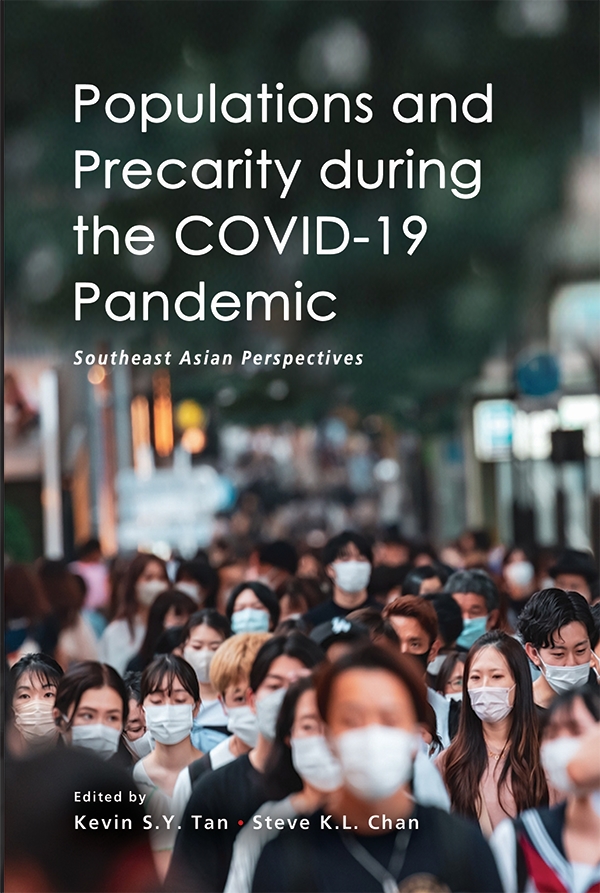Populations and Precarity during the COVID-19 Pandemic: Southeast Asian Perspectives
- About the Book
-
This volume is a collection of articles that examines how the COVID-19 pandemic affected and intersected with various Southeast Asian contexts in the broad areas of migration, education and demographic policy. At the height of the pandemic from 2020‒22, the resulting restrictions to international travel, ensuing nationwide lockdowns and eventual economic crises formed part of what many commentators referred to as a “new normal”. Apart from being a global health crisis, the pandemic disrupted and transformed the experience of everyday life at all levels of society, where many of its effects are now likely irreversible. In particular, the impact of the pandemic certainly affected the most vulnerable individuals and communities throughout the region, especially in countries that are experiencing rapid ageing such as Singapore and Thailand. Examples of the most affected include low-wage migrant workers, the disabled and the children of impoverished families. For many who were already living in a state of precarity, the structural “side-effects” of the pandemic were at times more deadly than the coronavirus itself as it often negatively impacted livelihood, social-emotional ties and overall well-being. At the same time, the “new normal” has further created conditions that raise the likelihood of occupational precarity even for long-term professionals within established fields like education. In other words, few experienced the COVID-19 pandemic without encountering both tangible and intangible challenges, regardless of where one was situated. Hence, by merging the theme of precarity with that of the pandemic’s undeniable and exacerbating effects, this volume hopes to establish a useful platform to reflect and learn from a range of scholarly views and to contribute to new knowledge and inform policymaking in Southeast Asian societies.
“This volume is a collection of thoughtful scholarship that examines the challenges that have been made more acute by the COVID-19 pandemic among and between Southeast Asian populations. The chapters here consider how the global public health crisis and its policy responses have aggravated various forms of precarity that had taken root in pockets of Southeast Asian societies. While history will be the ultimate judge of the true social and cultural consequences of COVID-19 policy responses, Populations and Precarity during the COVID-19 Pandemic: Southeast Asian Perspectives is an urgent reminder that while the worst of the pandemic may be behind us, much more remains to be done to relieve the most vulnerable among our populations of a different kind of long COVID.”–Associate Professor Lim Lee Ching, Dean of S R Nathan School of Human Development, Singapore University of Social Sciences
“We have all witnessed the impact that the COVID-19 pandemic had on our daily lives. This was especially true in areas such as Southeast Asia where local and regional economies rely on the movement of workers, both skilled and unskilled. The compilation of chapters in this volume provides an interesting examination of the struggles faced by many in Southeast Asia during this difficult period. Readers will realize that what was merely an inconvenience for some people was life altering for others. I highly recommend reading this book to increase awareness of the hidden consequences of such global catastrophes and perhaps better prepare for the next global event. It is hoped that this collection will inspire actions to resolve some of the current issues faced by vulnerable populations.”–Professor Gary La Point, Professor of Practice in Supply Chain, Whitman School of Management at Syracuse University
“A fascinating book that provides an insightful analysis of the ‘new normal’ and the impacts of COVID-19 pandemic in key areas such as migration, housing, education, disaster management, and ageing in Southeast Asia. The book provides invaluable perspectives and knowledge for social policymakers and students in Southeast Asia and beyond.” –Dr Sorasich Swangsilp, Director, Social Policy & Development (SPD) Programme (BA International Programme), Faculty of Social Administration, Thammasat University
“Populations and Precarity during the COVID-19 Pandemic provides a timely addition to our understanding of how the pandemic disrupted key areas of everyday life in Southeast Asia, a multi-ethnic and complex region. Thematically diverse and empirically rich, this book is an interdisciplinary collaboration that deserves academic attention.”–Professor Jongryul Choi,
Chair of the Department of Sociology, Keimyung University, South Korea
- About the Author(s)
-
Kevin S. Y. Tan, Editor
Kevin S. Y. Tan is a sociologist and cultural anthropologist. He is a Lecturer at the Chua Thian Poh Community Leadership Centre at the National University of Singapore.Steve K. L. Chan, Editor
Steve K. L. Chan is an Assistant Professor of Sociology at the Keimyung University, South Korea.










